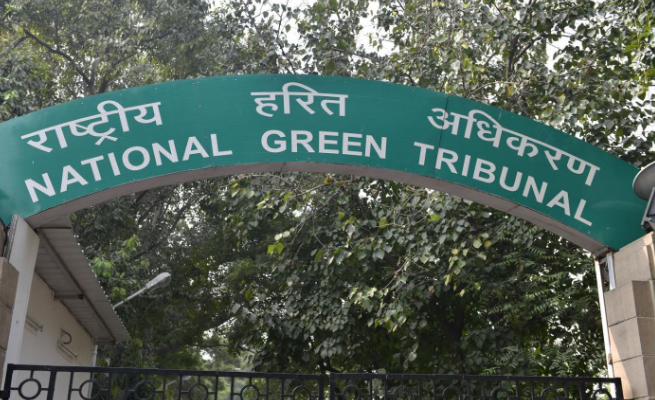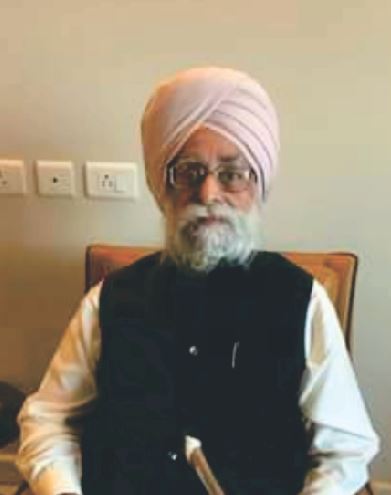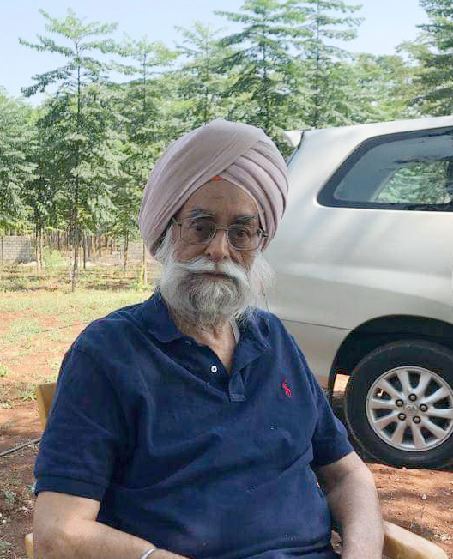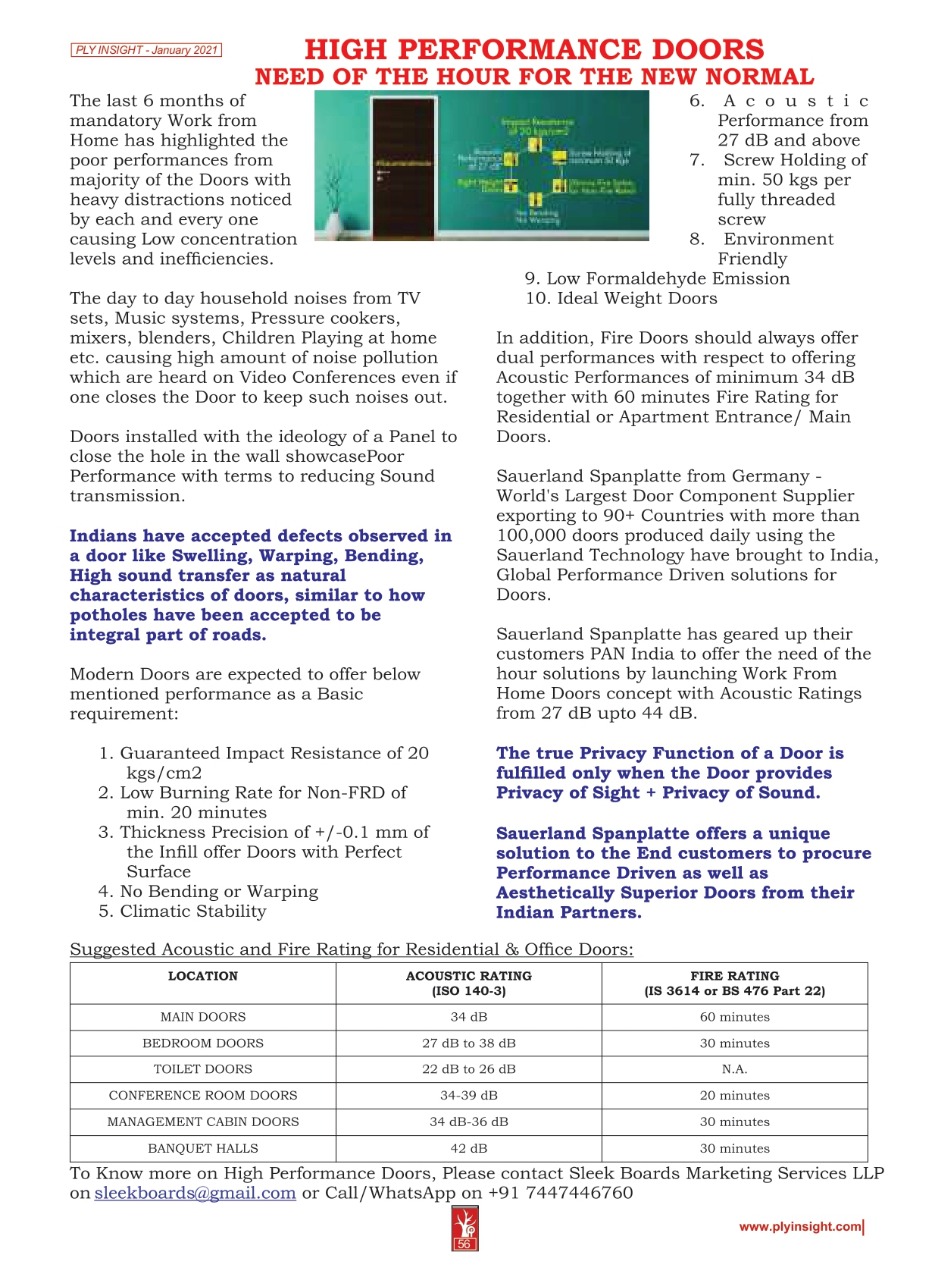
NGT Rejects Provisional W.B. Licenses in U.P
- January 17, 2021
- 0
Justice Adarsh Kumar Goel –Chairperson.
Order dated – 02-12-2020
1. Two Review Applications have been filed by the State of UP against common order of this Tribunal dated 18.02.2020 in O.A. 335/2019, Samvit Foundation v. State of U.P. & Ors. and O.A. No. 313/2019, Uday Education & Welfare Trust v. State of U.P. & Ors.
2. The issue considered by The Tribunal was validity of decision to establish more wood-based industries, without correctly determining availability of timber to sustain the same, as required in terms of judgments of Hon’ble Supreme Court inter-alia in State of H.P. v. Ganesh Wood Products, (1995) 6 SCC 363, T.N. Godavarman v. U.O.I., (1997) 2 SCC 267, (2006) 1 SCC 1, (2009) 16 SCC 398 and (2012) 12 SCC 297.
3. The Tribunal considered the matter after giving due opportunity to the State and the affected wood based industries. The Tribunal considered the affidavit dated 22.01.2020 filed by the Divisional Director of Forest, Hathras, on behalf of the State of UP, giving data of the existing saw mills/wood-based industries with their number, capacity and availability of wood species wise for the said saw mills for the period of three years. The Tribunal also considered written note filed on 18.02.2020 on behalf of State of UP, referring to India State of Forest Report (ISFR) 2019 to the effect that there is increase of ‘Forest and Tree Cover’. The note also mentioned that provisional licenses have been given to 1215 WBIs in February 2019 before the order of status quo, granted by this Tribunal (vide their order dated 01.10.2019) 632 WBIs have already established their units.
Plea of State Govt of UP before NGT
It may be noted that the wood production in the State is much higher than the present capacity of existing WBIs in the State. The same is also reflected from the fact that Large quantity of wood (unsawn timber) which is part of the surplus timber i.e. 38.74 lac cubic meter per year is being exported daily from U.P. to WBIs of other States, mainly Haryana, M.P., Uttarakhand and even Punjab.
That it may be noted that the farmers in U.P. are not getting remunerative price and are forced to sell their produce at very cheap rate mainly to middlemen.
That there would be expected investment of about R3,000 crore in the State with the establishment of new WBIs and employment generation of 80,000 people, mostly in the rural areas of the State. Apart from above, total expected annual turnover is R1200 Crore, which would be recurring in nature.
But the court observed the following points after gone through all records and presentation by the govt:
It is well settled that wood based industries/ saw mills can be allowed only after ensuring timber and raw material availability to sustain such industries. This has to be determined in actual terms and not on mere assumption. In the present case, we find it difficult to accept the stand of the State of Uttar Pradesh that there was availability of timber/raw material to sustain new WBIs/saw mills.
When FSI report says 77 lakh cubic meter of industrial wood is potentially available in the State of UP from Trees Outside Forests (TOF), it means that on the basis of the inventory of trees outside forests, 77 lakh cubic meter can be available annually, if the farmers harvest them.
Eucalyptus and Poplars that will be actually available for wood based industries in UP will not be 43 lakh cubic meter as assumed by the State of U.P., but will only be about 32 lakh cubic meter and other species not more than 10 to 12 lakh cubic meter.
In order to arrive at accurate assessment of timber that will be available for consumption by the industries, it is necessary to have District wise, species wise and diameter-class wise inventory. Such a study, if not already done, can be assigned to FSI who have undertaken similar studies for many States like Punjab and Maharashtra and others. It is only after such credible study and assessment that any further decision ought to be taken.
It has been mentioned in the Affidavit of the State that during 2019 there were 6,686 saw mills/wood based industries operating in the State of Uttar Pradesh and the capacity of these units is 41.5 lakh cubic meter per year. Therefore, the total Timber that will be actually available for new industries as per the data given in the Affidavit of the State is not going to be more than about 2 lakh cubic meter per year.
We are, therefore, satisfied that there will be hardly any industrial wood actually available for new wood based industries, based on above data made available by the State. In these circumstances, if new industries are allowed to open, based on wrong estimation of availability of timber, a situation may arise when there may not be any timber to be allotted to the unit or the industry may resort to illegal means to procure round timber in order to keep its unit afloat. Such a situation may not be allowed to come up in view of Precautionary principle of environmental law. State should therefore make an inventory species wise and district wise and also have species wise consumption data of all the wood based industries and their capacity to utilize them and not proceed with the present proposal till further exercise of making inventory and assessment of actual availability of timber / raw material is done.
We have considered the above submissions which are repetition of the arguments already dealt with by this Tribunal. Main issue was actual availability of timber which was never ascertained by the State. The State was proceeding on estimate basis which was not scientific. Thus, the Tribunal directed assessment of timber available for consumption which was not reflected in the species wise assessment of timber availability. There is, thus, no merit in the contentions in the review application. The Tribunal held that prohibited species being not available, had to be excluded from availability of timber. The standard error taken was based on the view of the FSI itself. The opinion of MoEF&CC is only that agroforestry should be encouraged. The opinion is based on availability of wood, assessed by the State, which assessment was found to be unscientific. Thus, the opinion of MoEF&CC could not be accepted without authentic unscientific data. The other points are based on inferences without any foundation.
We, thus, do not find any merit in the Review Applications and the same are dismissed.
Observation of PLY INSIGHT-
1 The UP State Govt have never taken any obligation to fulfill the requirement of WBI (neither Existing nor provisional licenses)
2 NGT failed to assure that farmers will be encouraged for more plantation if demand increase. This will lead for more harvesting of such wood and it will have two major impacts:
More Forest Cover
- Shifting of Farmers from traditional crops, which is a major issue in the farmer’s protest.
3 NGT’s obligation is to save actual FOREST under the preview of State/Central Govt. Not on Private FARMING. If the demand decreased and plantation timber have negative prices, farmers will decrease the plantation automatically.

Amrik Singh Anand, Technocrat, Farmer, Environmentalist. A Farmer and Technocrate Yes, it is a peculiar situation created by policy paralysis in govt.
NGT is perfectly justified to ask for growth data districtwise to assess the raw material Availability to allow state govts to issue more licenses for WBI. The inaction on part of GoI will further distress the tree farmers thus increasing Farmers suicides which shall be detrimental to growth of AF-AW & Bamboo plantations thus further addung to global warming & environmental problems. GoI has to act speedily otherwise it will be too late.
MoA has made its intentions very clear by not including AW-AF plantations timbers as Agriproduce in 3 Controversial laws enacted recently, & MoEF acting as disinterested party & leaving AW-AF as an abonded child. Thus creating more uncertainty developments of WBI. NGT is acting toughly due to SC ban imposed in late 90,s after seeing deplorable conditions of natural forests which forced WBI to migrate to greener pasture in North India. Courtesy Wimco & ITC. Many reputed industrial houses from Eastern India were wiped out due to this migration. This has created permanent elements of fear complex & uncertainty to grow with speed. It is fact that both govt ministries have too much in their plates & cannot handle more. So it is important & imperiative on GoI to set up and independent dept to look after dept of AW-AF & Bamboo plantations independently & have uniform system through out India.
Let us hope govt understands the need & would act expeditiously. MoEF should act & instruct state govts Forest dept to digitalise districtwise species wise data collections AW-AF & Bamboo plantations so that realistic picture is available to NGT/licensing authorities to give permission for new WBI units expeditiously to minimize farmers hardships in disposing their produce. Moef should issue comprehensive directives to stat forest dept to exempt all such produce fm all forest rules Reg felling, transportations & selling for ease of doing business throughout India.

Subhash Jolly, President Wood Technologist Association It is such a peculiar situation that even tribunals are not able to understand that they are dealing with agro forestry which all farmers as well as all stakeholders want to be declared as an agri produce.
Do these judges or members of NGT believe that to issue a license for setting up a rice mill, there is need for survey and assessment of paddy cultivating fields in UP. The person who is setting up a rice mill is supposed to assess paddy producing areas as he is the only on taking risk by investing his money. Similar is the case with wood processing industries as people investing money in these units are risking their investment, and neither the stat government nor the NGT!!
Best way to enable growth of trees outside forests (ToF) is to ease felling and transit restrictions across the country and stop irrational licensing system which state governments/NGT are putting up for ToF wood processing units. MoEF does not need to regulate but needs to focus on deregulation. This would be MoEF’s biggest service to agro forestry farming communities.
एनजीटी ने लकड़ी आधारित उद्योग के उत्तर प्रदेश सरकार की रिव्यू पिटीशन को भी खारिज किया
सही से आंकड़े नहीं रख पाया यूपी का वन विभाग, खामियाज़ा भुगतना पड़ेगा इंडस्ट्री और किसानों को
एक बार फिर से एनजीटी ने उत्तर प्रदेश सरकार की रिव्यू पिटीशन को भी खारिज कर दी है। इसके साथ ही प्रदेश में लकड़ी आधारित इंडस्ट्री लगाने के सरकार के प्रयास को बड़ा झटका लगा है। इसके साथ ही एनजीटी का यह निर्णय किसानों के हित में भी माना जा रहा है। क्योंकि जिस तरह से फसलों के विविधिकरण को लेकर लगातार प्रयास हो रहे हैं। इस दिशा में एग्रोफाॅरेस्ट्री एक बड़ा विकल्प हो सकती है। समस्या यह है कि यदि नई इंडस्ट्री आएगी ही नहीं तो किसान तैयार लकड़ी को कहां बेच पाएंगे। जाहिर है जब मांग नहीं होगी तो रेट भी अच्छा नहीं मिलेगा।
मार्च 2019 में यूपी सरकार ने लाइसेंस जारी करने का प्रस्ताव दिया था लेकिन एनजीटी इन दलील से सहमत नहीं है। लकड़ी आधारित नये उद्योग की स्थापना करने के लिए राज्य सरकार द्वारा जारी नोटिस को खारिज करते हुए कहा कि इन इकाइयों के लिए मुश्किल से ही लकड़ी मिल पाएगी।
उत्तर प्रदेश सरकार ने एक मार्च, 2019 को एक नोटिस जारी कर प्रदेश में 1350 नये लकड़ी आधारित उद्योगों के लिए लाइसेंस जारी करने का प्रस्ताव दिया था। लाइसेंस देने की प्रक्रिया शुरू हुई थी कि मामला एनजीटी में चला गया। इस पर एनजीटी ने राज्य सरकार को नोटिस जारी कर प्रदेश में लकड़ी की उपलब्धता के आंकड़ें मांगे थे। एनजीटी यूपी सरकार की दलील से सहमत नहीं हुआ। इस तरह से लाइसेंस पर रोक लगा दी। इसके जवाब में यूपी के वन विभाग की ओर से 22 जनवरी 2020 में एक रिव्यू पिटीशन दायर की थी।
रिव्यू पिटीशन में बताया गया कि प्रदेश में 3874 लाख क्यूबिक मीटर लकड़ी हर साल सरप्लस है। बताया था कि लकड़ी ज्यादा है, किसानों को सही दाम नहीं मिल रहे हैं क्योंकि प्रदेश में स्थापित लकड़ी आधारित इंडस्ट्री की क्षमता कम है। इसलिए यहां के किसानों को यह लकड़ी बेचने के लिए उत्तराखंड, हरियाणा, एमपी यहां तक की पंजाब में जाना पड़ता है। इस तरह से उन्हें लकड़ी को ले जाने में काफी खर्च करना पड़ता है। इसके साथ ही उन्हें सही दाम भी नहीं मिल पाते। क्योंकि दूसरे राज्यों में यूपी के किसानों को कम दाम पर लकड़ी बेचने के लिए मजबूर किया जाता है।
इतना ही नहीं नई इंडस्ट्री आने से प्रदेश में 3,000 करोड़ रूपये का निवेश आएगा। इसके साथ ही प्रदेश में 80,000 लोगों को रोजगार मिलेगा। इसमें ज्यादातर रोजगार ग्रामीण युवाओं को मिलेगा। इससे 1200 करोड़ का टर्नओवर प्रतिवर्श होगा। इसके साथ ही प्राकृतिक संरक्षण की दिशा में बड़ा कदम भी बढ़ पाएगा।
कोर्ट ने कहा कि लकड़ी के जो आंकड़े दिए गए, वह सही नहीं है। इसमें बताया गया कि प्रदेश में (प्रदेश सरकार की ओर से कोर्ट में दिए गए शपथ पत्र में बताया गया था कि) पहले ही 6686 लकड़ी आधारित इंडस्ट्री है। इनकी क्षमता 41.5 लाख क्यूबिक मीटर प्रति वर्ष है। इधर जो डाटा प्रदेश सरकार की ओर से लकड़ी का दिया गया वह एक आकलन है। पुख्ता रिपोर्ट के मुताबिक प्रदेश में 32 लाख क्यूबिक मीटर लकड़ी पाॅपलर और 10 से 12 लाख क्यूबिक मीटर लकड़ी दूसरी किस्म की है। इसलिए कोर्ट यह मान रही है कि जितनी लकड़ी प्रदेश में हैं, उसकी खपत के लिए मौजूदा इंडस्ट्री काफी है। कोर्ट ने कहा कि यूपी में लकड़ी की उपलब्ध्ता के लिए स्टड़ी सही से नहीं की है। होना तो यह चाहिए कि पंजाब व महाराश्ट्र की तरह जिस स्तर पर लकड़ी की उपलब्धता, इसकी किस्मों का आंकलन किया जाना चाहिए। जिससे लकड़ी के वास्तविक आंकड़े मिले।
क्यों कोर्ट ने स्वीकार नहीं की रिव्यू पिटीशन
क्योंकि कोर्ट ने कहा कि सरकार की ओर से जो डाटा दिया गया, वह सिर्फ अनुमान और अंदाजों पर है। जबकि होना यह चाहिए कि सरकार लकड़ी की उपलब्धता के लिए जिलावार स्टडी कराए। इससे लकड़ी के सही डाटा मिले। जिससे यह पता चले कि लकड़ी कितनी उपलब्ध है। क्योंकि यदि लकड़ी की उपलब्धता उतनी नहीं है, जितनी की इंडस्ट्री को चाहिए तो इससे होगा यह कि लकड़ी की तस्करी होगी या फिर अवैध कटान होगा। जो किसी भी मायने में सही नहीं है। कोर्ट ने यह भी कहा कि निश्चित ही एग्रोफाॅरेस्टरी को बढ़ावा दिया जाना चाहिए। लेकिन इसके लिए सरकार को उचित कदम उठाने होंगे। एनजीटी की प्राथमिकता जंगल बचाने की है। हम इसी दिशा में काम कर रहे हैं। जहां तक किसानों की बात है, यदि उन्हें पैसा नहीं मिलेगा तो वह खुद ही एग्रोफाॅरेस्ट्री कम कर देंगे।

अमरीक सिंह आनंद, तकनीकी विशेषज्ञ, किसान, पर्यावरणविद, ने कहा कि इस स्थिति के लिए सीधे-सीधे सरकार की गलत नीतियां जिम्मेदार हैं। पर्यावरण मंत्रालय की सोच स्पष्ट है। एमओए ने पहले ही साफ कर दिया कि खेत में उगाई लकड़ी उनके दायरे से बाहर है। एनजीटी को भी यह निर्णय देते वक्त सुप्रीम कोर्ट के 1990 में लकड़ी को लेकर हटाए प्रतिबंध को भी ध्यान में रखना चाहिए। कैसे तब एग्रोफाॅरेस्ट्री को परिभाषित किया गया था। इसमें लकड़ी आधारित उद्योग कैसे प्राकृतिक जंगलों को छोड़ कर एग्रोफाॅरेस्ट्री पर आ गए थे।
तब वीमको और अन्य कई इंडस्ट्री ने एग्रोफाॅरेस्ट्री को बढ़ावा देने के लिए पौधे रोपण अभियान चलाए थे। इसलिए अब वर्तमान हालात में भारत सरकार को चाहिए कि एक अलग से विभाग स्थापित किया जाए जो एग्रोफाॅरेस्ट और कृषि में पैदा हो रही लकड़ी बाॅंस आदि के उत्पादन को बढ़ावा दें, और इसकी कटाई आदि के लिए राष्ट्रीय स्तर पर एक सिस्टम बनाए।
वह कहते हैं कि एनजीटी ने एग्रोफोरेस्ट्री के जो डाटा जुटाने के निर्देश दिए हैं वह सही है। जिसका आंकलन कर नए लाइसेंस जारी किए जा सके। लेकिन इस तरह से लाइसेंस देने की प्रक्रिया पर रोक लगाने से एग्रोफाॅरेस्ट्री को धक्का लगेगा। क्योंकि जब तक लकड़ी आधारित इंडस्ट्री होगी ही नहीं और इसे बढ़ावा नहीं दिया जाएगा तो कैसे एग्रोफोरेस्ट्री को मार्केट मिलेगी। जब इंडस्ट्री कम होगी और माल ज्याद होगा तो जाहिर है इससे किसानों को नुकसान होगा। एग्रोफाॅरेस्ट्री से किसानों की आर्थिक स्थिति ठीक हो सकती है। इससे कर्ज से किसान उभर सकते हैं। यदि लकड़ी आधारित उद्योगों को बढ़ावा नहीं मिलेगा तो कैसे एग्रोफाॅरेस्ट्री के दाम किसानों को अच्छे मिलेंगे। जाहिर है, जब जिस तरह से अन्य फसलों से किसानों को नुकसान हो रहा है, इसी तरह से एग्रोफाॅरेस्ट्री भी तब उसके लिए फायदे का सौदा नहीं हो सकती, ऐसे में हालत में किसानों में आत्महत्या की बढ़ी रही घटनाओं को रोकना भी संभव नहीं हो सकता। एग्रोफाॅरेस्ट्री हर लिहाज से आज के वक्त की जरूरत है, यह फसल विविधिकरण की दिशा में बड़ा कदम है। किसान की आमदनी बढ़ा सकती है। ग्लोबल वार्मिंग को रोक सकती है। बढ़ते प्रदूषण को कम कर सकती है। लेकिन इसके लिए शर्त इतनी है कि लकड़ी आधारित इकाईयों को बढ़ावा दिया जाना चाहिए। जिस तरह से यूपी में लकड़ी आधारित लकड़ी की यूनिट के लाइसेंस पर रोक लगी, यह सही नहीं है।
उम्मीद की जानी चाहिए कि सरकार एनजीटी के इस निर्णय से सीख लेगी।

सुभाश जाॅली , अध्यक्ष, वुड टेक्नोलोजिस्ट एसोसिएशन, कहते हैं कि अब वक्त आ गया कि एग्रोफाॅरेस्ट्री की परिभाशा स्पश्ट की जाए। प्राकृतिक जंगल और खेत में उगायी जाने वाली लकड़ी का अंतर स्पश्ट होना चाहिए। तभी किसान, खेत, पर्यावरण और लकड़ी आधारित उद्योग का भला हो सकता है। ऐसा नहीं कि जंगल की तरह एग्रोफाॅरेस्ट्री को भी परिभाशित किया जाए। यह गलत है। इससे किसान, उद्योग और पर्यावरण तीनों का नुकसान है। एनजीटी एग्रोफाॅरेस्ट्री और जंगल मेंअंतर समझने में जितनी देरी करेगी, उतना ही नुकसान किसान और उद्योग का होाग। क्योंकि किसान, उद्योग हर कोई चाह रहा है कि एग्रोफाॅरेस्ट्री को जंगल के दायरे से बाहर होना ही चाहिए। उन्होंने कहा कि क्या राइस मिल का लाइसेंस देने से पहले प्रदेश में यह सर्वे किया जाए कि धान का उत्पादन कितना हो रहा है। ऐसा तो नहीं होता। फिर लकड़ी आधारित उद्योग में यह क्यों हो रहा है। यह गलत है। जिस तरह से राइस मिल है, उसी तरह से लकड़ी आधारित उद्योग है। क्योंकि राइस मिल में धान से चावल तैयार होता है, इसी तरह से लकड़ी आधारित उद्योग में खेत में तैयार लकड़ी का कच्चे माल के तौर पर इस्तेमाल किया जाता है। अब इससे भला एनजीटी को क्या एतराज हो सकता है। उन्होंने कहा कि जिस तरह से राइस मिलर्स स्वयं चिंता करेगा कि उसके पास धान कहां से आएगा। यदि उस इलाके में धान की खेती कम होगी तो वह प्रयास करेगा कि इसका रकबा बढ़ाया जाए। वह सरकार या एनजीटी की ओर नहीं देखेगा कि धान का क्षेत्रफल बढ़ाया जाए। क्योंकि उसने राइस मिल पर खर्च किया है। इसी तरह से यदि सरकार लकड़ी आधारित उद्योग को ज्यादा से ज्यादा लाइसेंस देती है तो यह चिंता इंडस्ट्रिलिस्ट की होनी चाहिए। उन्होंने कहा पूरे देश में लकड़ी आधारित यूनिट लगाने के लाइसेंस प्रक्रिया को खत्म कर दिया जाना चाहिए। पर्यावरण एवं वन मंत्रालय को इसकी आवश्यकता ही नहीं है। यदि ऐसा किया जाता है तो मंत्रालय की देश में एग्रोफाॅरेस्ट्री और किसानों के कल्याण में बड़ा कदम साबित होगा।































































